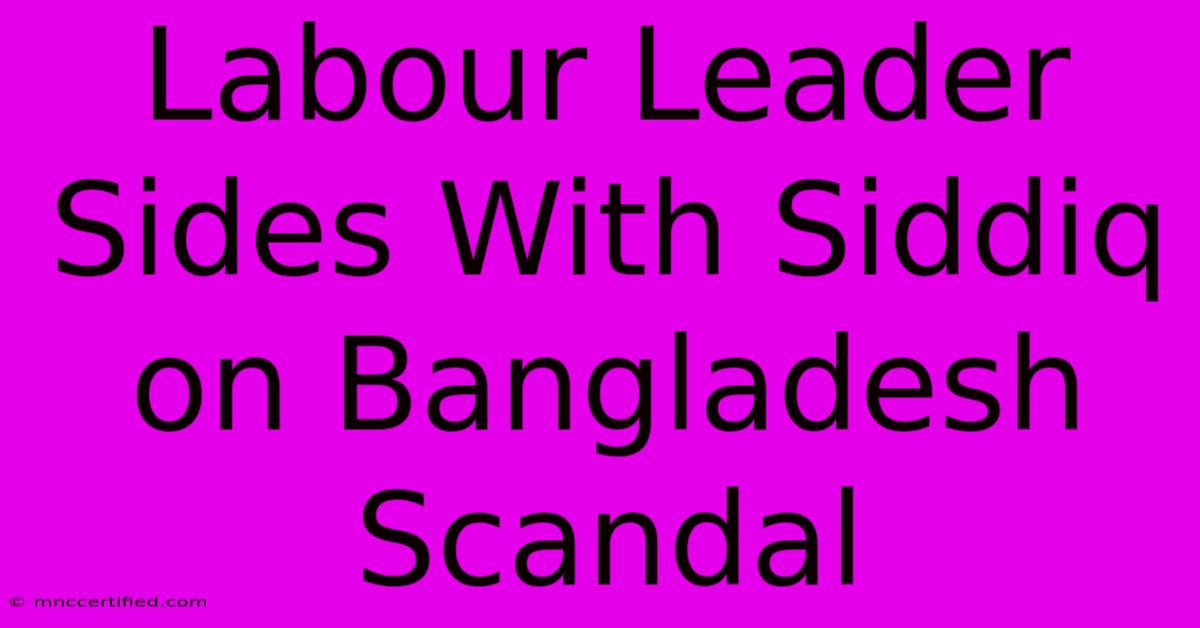Labour Leader Sides With Siddiq On Bangladesh Scandal

Table of Contents
Labour Leader Sides With Siddiq on Bangladesh Scandal: A Deep Dive into the Controversy
The recent scandal surrounding Bangladeshi garment factories and the Labour Party's response has ignited a firestorm of debate. The spotlight is firmly on Labour leader, Keir Starmer, and his vocal support for Tulip Siddiq, the MP at the heart of the controversy. This article delves into the details of the scandal, examines Starmer's stance, and analyzes the potential political ramifications.
The Bangladesh Scandal: A Summary of the Allegations
The core of the controversy revolves around allegations of unsafe working conditions and exploitation within Bangladeshi garment factories supplying major Western brands. These allegations, which have been circulating for years, have recently resurfaced with renewed intensity, fueled by [mention specific reports or investigative journalism pieces, linking to reputable sources]. The accusations include:
- Unsafe working conditions: Reports detail inadequate safety measures, leading to worker injuries and deaths.
- Unfair wages and exploitation: Workers allegedly receive wages far below a living wage, with excessive overtime and poor working conditions.
- Lack of accountability: Concerns have been raised about the lack of accountability from both the factories themselves and the brands sourcing garments from them.
Tulip Siddiq, a prominent Labour MP, has been directly involved in discussions surrounding this issue, and her actions (specifically mention the actions that caused controversy – e.g., statements made, votes cast, meetings attended) have drawn significant criticism.
Keir Starmer's Backing of Siddiq: A Calculated Move or Political Miscalculation?
Labour leader Keir Starmer has publicly expressed his support for Tulip Siddiq amidst the unfolding scandal. This backing, however, is not without its critics. Some argue that Starmer's decision is a demonstration of party loyalty, while others perceive it as a political miscalculation that could alienate voters concerned about ethical sourcing and human rights.
Analyzing Starmer's Stance:
Several interpretations of Starmer's support for Siddiq exist:
- Party Unity: Maintaining party unity is crucial for any leader, and supporting a fellow MP, even amidst controversy, might be seen as a strategic move to avoid internal divisions.
- Political Pragmatism: Starmer may be prioritizing his party's image and avoiding further damaging publicity by firmly supporting Siddiq.
- Lack of Concrete Action: Conversely, critics argue that Starmer's support lacks concrete action to address the underlying issues of worker exploitation in Bangladesh. The absence of a comprehensive Labour Party plan to tackle the problem undermines the credibility of their support.
The Political Ramifications: A Tightrope Walk for the Labour Party
This scandal presents a significant challenge for the Labour Party. Their response, or lack thereof, will have far-reaching consequences on their image and electability.
Potential Impacts:
- Damage to Labour's Reputation: The controversy could damage Labour's reputation on issues of social justice and ethical trade, potentially costing them votes from ethically conscious voters.
- Opportunities for the Conservatives: The Conservatives could exploit the situation to attack Labour's credibility and highlight their own (alleged) stronger stance on ethical trade.
- Public Pressure for Change: The scandal could galvanize public pressure for greater transparency and accountability within the garment industry and push for stricter regulations.
Conclusion: Navigating a Complex Ethical and Political Landscape
The Labour leader's decision to side with Tulip Siddiq in the Bangladesh scandal is a complex issue with far-reaching implications. While demonstrating party loyalty might be a short-term strategy, the long-term effects on Labour's reputation and its stance on ethical trade remain to be seen. The situation highlights the need for stronger political leadership and concrete action to address the persistent problem of exploitation within the global garment industry. The coming weeks and months will be crucial in determining how this controversy ultimately impacts the Labour Party and the broader debate on ethical sourcing and human rights.
Keywords: Labour Party, Keir Starmer, Tulip Siddiq, Bangladesh, garment factories, scandal, ethical trade, human rights, exploitation, unsafe working conditions, political ramifications, party loyalty, social justice, accountability, ethical sourcing.

Thank you for visiting our website wich cover about Labour Leader Sides With Siddiq On Bangladesh Scandal. We hope the information provided has been useful to you. Feel free to contact us if you have any questions or need further assistance. See you next time and dont miss to bookmark.
Featured Posts
-
Arenado Vetoes Trade 10 Time Gold Glover Stays Put
Dec 20, 2024
-
Man Of Steel Trailer Superdog Joins
Dec 20, 2024
-
Rachel La Mont Survivor 47 Win
Dec 20, 2024
-
Arenados Astros Trade Rejection Why
Dec 20, 2024
-
Is Superman Still Relevant Today
Dec 20, 2024